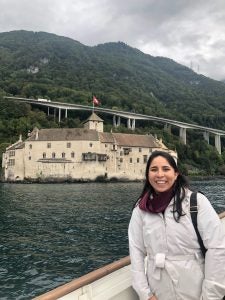Exchange Program Semester Abroad:
Geneva Graduate Institute, Switzerland

Cristina spent the fall semester of her 3L year at the Geneva Graduate Institute (formerly the Graduate Institute of International and Development Studies) in Geneva, Switzerland.
Why did you decide to study abroad?
Growing up around the world, I have always valued opportunities to engage with different perspectives, especially when it comes to tackling the world’s biggest challenges. I came to Harvard Law School knowing that I wanted to study and practice international law, specifically in the context of economic development. My goal was to learn the skills necessary to build and uphold legal institutions that protect basic human and economic rights in the developing world.
For this reason, I have always wanted to study international law abroad, specifically in Geneva. As the hub of several international organizations and international courts, it serves as the perfect place to study the intersection of public and private international law, and the ways in which international institutions can influence private action.
How did you prepare?
Throughout my time at HLS, I sought out opportunities to participate in the international law community. I took classes in international law, participated in journals and student groups with students interested in international law, and told them about my interest in going abroad.
For someone interested in international legal regimes, rather than specific regions or countries, Geneva seemed like the place to be. I spoke with three HLS students who had studied at the Institute, and the more I learned the more it seemed like the perfect fit. Its courses would provide a mix of theoretical and practical knowledge and cover a broad range of international dispute systems and legal fields, and its students were all at the graduate level, like me.
In terms of language skills, I am also fluent in French after spending a few years in France during my childhood, and taking advanced French classes in high school and college.
What courses did you take at the Institute?
I chose classes from the Masters in International Law program at the Institute. My courses were a mixture of traditional black letter law classes and more theory-based seminars. They included International Trade Law, Law without the State, Change and Stability in the International Legal Order, Law of International Organizations, and Compliance with International Law.
Throughout the semester, I learned about different compliance theories underlying international law; that knowing why international law remains stable is just as important as knowing why international law changes; how legal positivists and legal realists disagree about what makes a norm a “law”; how the WTO adjudicates disputes between members; and how international organizations balance their duties to individual members with their broader responsibility to the world.
The Institute prides itself in its interdisciplinary style of teaching, meaning that my classes were with students from a variety of backgrounds, not just lawyers. My classmates brought their own experiences as practitioners or academics to bear in the classroom which truly enriched my learning. I was exposed to new schools of thought and new ideas, and challenged in new ways through classroom discussions and assignments. Most of my classes had fewer than 20 students (two of them had fewer than 10). I had hoped to take a law class in French, but unfortunately this was not possible while I was there.
How was the experience?
It was unforgettable and easily the most impactful decision I made in my law school career. Professors came from a variety of backgrounds and were very approachable and available to talk with students. I knew all of my professors by name and they knew me, and I felt comfortable talking with them about topics and speaking up in class.
Throughout the semester, I found myself at various film screenings and talks with students and practitioners from around the world, debating the latest topics whether it was money in politics, the political and social crisis in Venezuela, or the ban on therapeutic abortions in Guatemala. The atmosphere was unique in that students were practicing lawyers and scholars from different parts of the world and brought their own experiences and perspectives to the Institute. I will carry the lessons I learned from my time abroad with me throughout my legal career.
How will the semester abroad fit in with your career plans?
After graduation, I will be clerking for Judge Jane Restani at the U.S. Court of International Trade in New York City. I was able to explore my interest in international trade during my time in Geneva. I also learned about the different career paths available to me after graduation in the international legal world. As someone interested in working abroad in the future, my experience studying abroad helped contextualize my interests and provided me with valuable skills and information that will help me continue to grow my international legal career after HLS. It was an invaluable part of my legal education and I cannot recommend it enough.